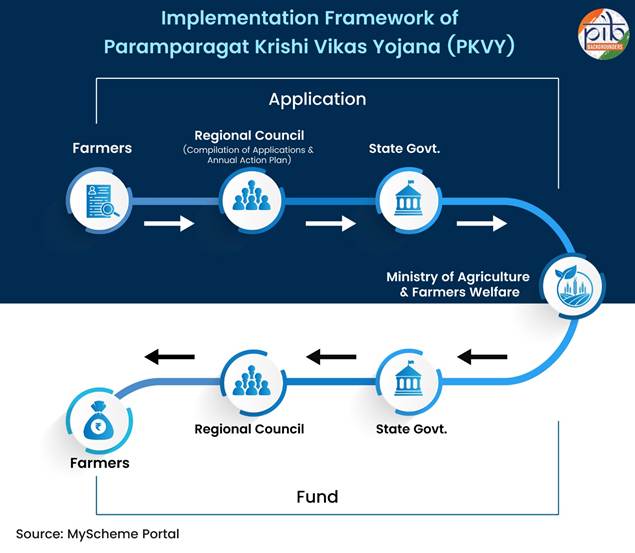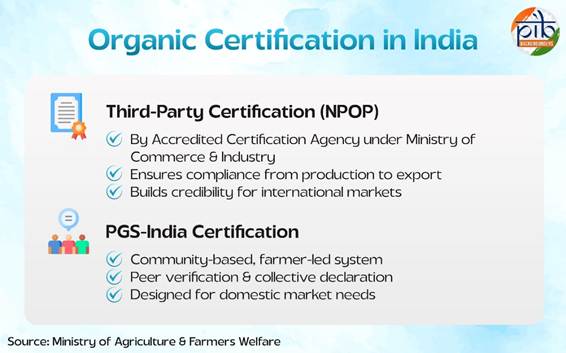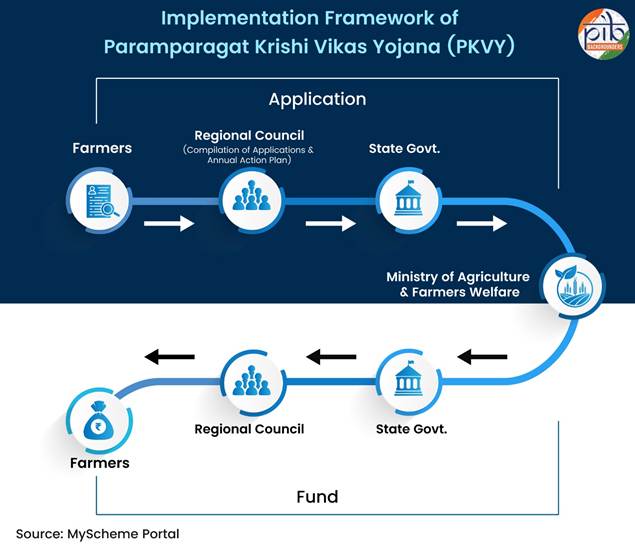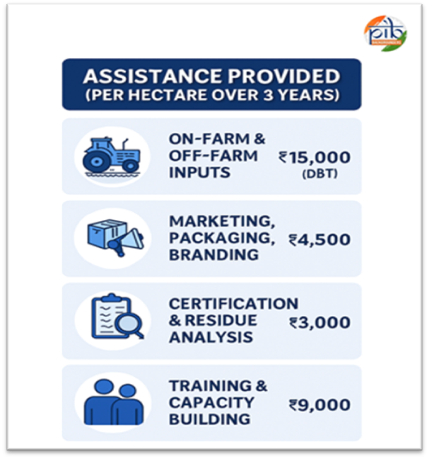Paramparagat Krishi Vikas Yojana (PKVY): Nurturing Organic Farming in India

IN NEWS:
Paramparagat Krishi Vikas Yojana (PKVY): Nurturing Organic Farming in India
Analysis
- Context:
The Paramparagat Krishi Vikas Yojana (PKVY), launched in 2015 under the National Mission for Sustainable Agriculture (NMSA), has become a major driver of India’s organic farming revolution. The scheme aims to promote eco-friendly, chemical-free farming practices while enhancing farmers’ income and environmental sustainability. - Recent Developments (2024–25):
- As on 30 January 2025, a total of ₹2,265.86 crore has been released under PKVY (2015–25).
- In FY 2024–25, an additional ₹205.46 crore has been released under Rashtriya Krishi Vikas Yojana (RKVY) for PKVY activities.
- 15 lakh hectares have been brought under organic farming, benefiting 25.30 lakh farmers through 52,289 clusters as of February 2025.
- The Jaivik Kheti Portal has registered 6.23 lakh farmers, 19,016 local groups, 89 input suppliers, and 8,676 buyers (as of December 2024).
- Under the Large Area Certification (LAC) programme, tribal and ecologically preserved zoneshave received faster organic certification—
- 14,491 hectares certified in Car Nicobar & Nancowry Islands,
- 2,700 hectares in Lakshadweep (entire cultivable land),
- 60,000 hectares in Sikkim, now the world’s only 100% organic state,
- 5,000 hectares proposed in Ladakh.
- Implementation Highlights:
- Cluster-based approach: groups of 20 hectares formed for collective adoption of organic farming.
- Financial assistance: ₹31,500 per hectare over three years, covering input costs, training, certification, and marketing through Direct Benefit Transfer (DBT).
- Participatory Guarantee System (PGS-India) ensures community-led, low-cost certification for domestic markets.
- Third-Party Certification (NPOP) under the Ministry of Commerce enables international trade in organic products.
- Significance:
- Strengthens soil health and reduces chemical dependency.
- Promotes low-cost, eco-agriculture aligned with Atmanirbhar Bharat and Digital India.
- Encourages entrepreneurship and direct farmer-consumer linkages via Jaivik Kheti.
- Contributes to climate resilience, environmental conservation, and rural income diversification.
- Challenges & Way Forward:
- Wider adoption in non-hilly and non-tribal regions remains limited.
- Need for consistent market access and consumer awareness about organic produce.
- Integration with the National Mission on Natural Farming (NMNF) is expected to enhance long-term sustainability and scalability.
Static / Background Information
| Aspect | Details |
|---|---|
| Scheme Name | Paramparagat Krishi Vikas Yojana (PKVY) |
| Launched In | 2015 |
| Under Ministry | Ministry of Agriculture & Farmers Welfare |
| Umbrella Mission | National Mission for Sustainable Agriculture (NMSA) |
| Financial Assistance | ₹31,500 per hectare (for 3 years) |
| Implementation Mode | Cluster-based (20 hectares per cluster) |
| Certification Systems | 1. Participatory Guarantee System (PGS-India) 2. National Programme for Organic Production (NPOP) |
| Digital Platform | Jaivik Kheti Portal |
| Special Initiative | Large Area Certification (LAC) for tribal & island regions |
| Total Funds Released (2015–25) | ₹2,265.86 crore (as on 30 Jan 2025) |
| Major Outcomes | 15 lakh hectares under organic farming; 25.30 lakh farmers benefitted; 52,289 clusters formed |



Updated – 06 Oct 2025 ; 11:38 AM | PIB